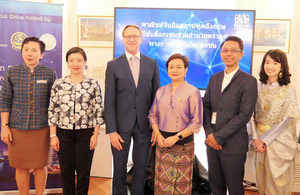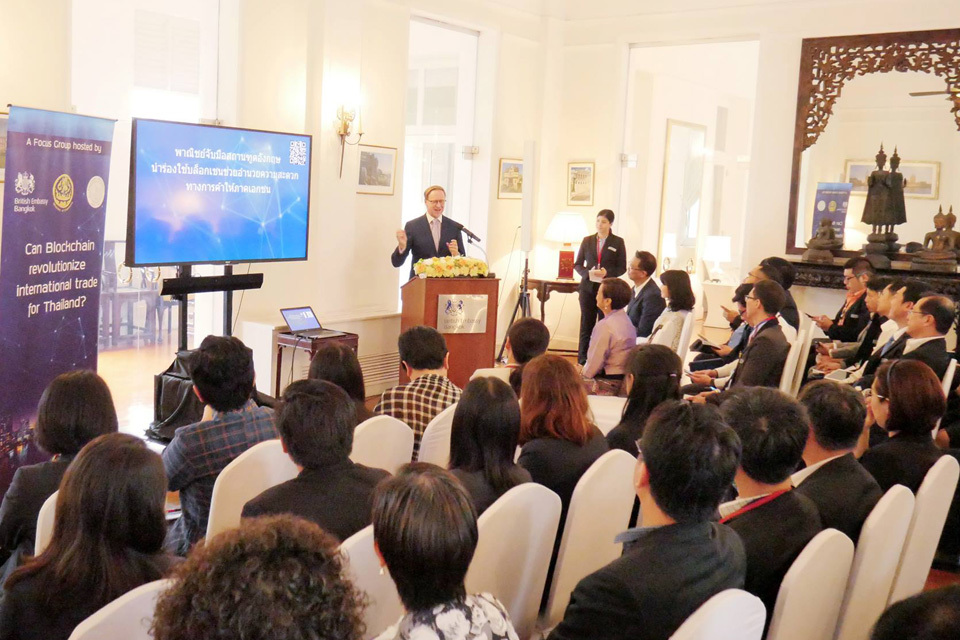Thailand: Ministry of Commerce and British Embassy join forces to bring blockchain for trade facilitation
The UK is partnering with the government of Thailand to support its efforts to improve Thailand's business environment.

Thailand: Ministry of Commerce and British Embassy join forces to bring blockchain for trade facilitation
The Trade Policy and Strategy Office (TPSO) and the British Embassy in Bangkok jointly opened a focus group on ‘Can blockchain revolutionise international trade for Thailand?’ on 31 January. The project advisor is Kasetsart University Institute for Information Technology Innovation (KU-Inova).
British ambassador to Thailand Mr Brian Davidson said that the UK is a strong supporter of liberal trade, open markets as well as technology adaptation to facilitate better trade.
The work on blockchain is one of the areas where the UK is partnering with the government of Thailand to support its efforts to improve Thailand’s business environment. The British Embassy also believed that blockchain, or distributed ledger technology (DLT) has the potential to deliver improvements in many areas of the economy. Thereby, the British Embassy has been very pleased to work so closely with the Ministry of Commerce and Kasetsart University on this project to explore potential use case of blockchain technology to facilitate international trade document and trade finance.

Focus group: Can blockchain revolutionize international trade for Thailand?
Ms. Pimchanok Vonkorpon, Director-General, Trade Policy and Strategy Office, Ministry of Commerce said that blockchain is a new technology that would revolutionise society in the digital age not only in the area of business, but also government administration.
Blockchain is a distributed ledger technology (DLT) that can keep unchangeable records of transactions. Transactions on blockchain are updated by consensus in the network without the need for an intermediary. The mechanism makes it impossible to hack - and is therefore being considered as the method to maintain data integrity - and makes it possible to create smart contracts that can be executed automatically in accordance with the certain terms of the agreement. This reduces the risk of fraud or contractual dispute between the parties.
Consequently, the Ministry of Commerce therefore launched the feasibility study of blockchain technology and innovation for trade finance and trade facilitation in Thailand. This project is financially supported by the British Embassy and Assistant Professor Dr Somnuk Keretho, Director of KU-Inova, is the project adviser.
Assistant Professor Somnuk said that nowadays, small and medium-sized enterprises (SMEs) tend to have financial liquidity problem of receiving none or low amount of loans because of trading risks. One of the risks is caused by the documents’ unreliability, frauds and errors. Moreover, there are numerous documents involving in international trade, eg invoice, Certificate of Origin, exports permission documents, delivery order (D/O) etc., as well as the complicated and time-consuming coordinating processes between all parties involved. Therefore, blockchain would help easing these pain points of trade finance and trade facilitation.
According to the draft pilot projects proposed for discussion on the day, there are at least 6 possible projects divided into 2 stages, a short-term and intermediate term action plan (3 to 5 years) that TPSO will discuss with related agencies for future implementation.
TPSO and the Department of Foreign Trade (DFT), Ministry of Commerce has agreed on the possible of implementation a quick-win project within in this year. The project would connect and exchange electronic Certificate of Origin and related export certificates from the issuing agencies, such as the DFT, Ministry of Commerce, the Federation of Thai Industries (FTI), and Thai Chamber of Commerce (TCC), to banks blockchain platforms.
Other intermediate (3 to 5 years) projects are:
- establishing a cross-border blockchain platform for electronic Certificates of Origin and related export certificates
- establishing a blockchain collaborative platform for efficient import freight logistics and related procedures through the Bangkok Port
- extending the project of cross-border blockchain for electronic Certificate of Origin to cover different types of export certificates issued by other government authorities
- expanding the project of blockchain collaborative platform for efficient import freight logistics and related procedures
- establishing a blockchain traceability platform for supply chain visibility
Ms Pimchanok added that TPSO would work closely with other responsible parties to explore the possibility of implementing the project proposals in the future. She also believed that the blockchain adaptation would facilitate better trade and support the country’s competitiveness.